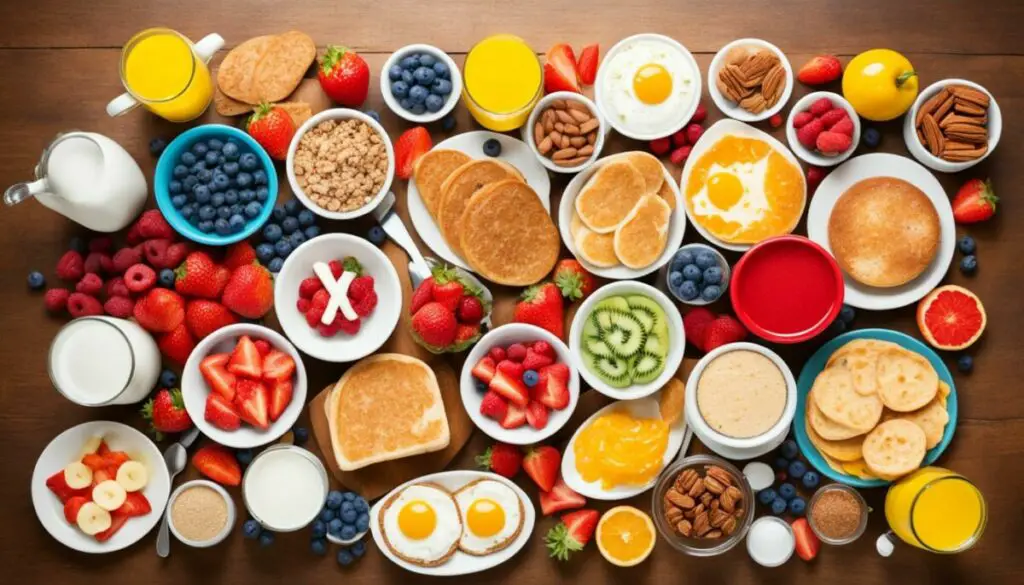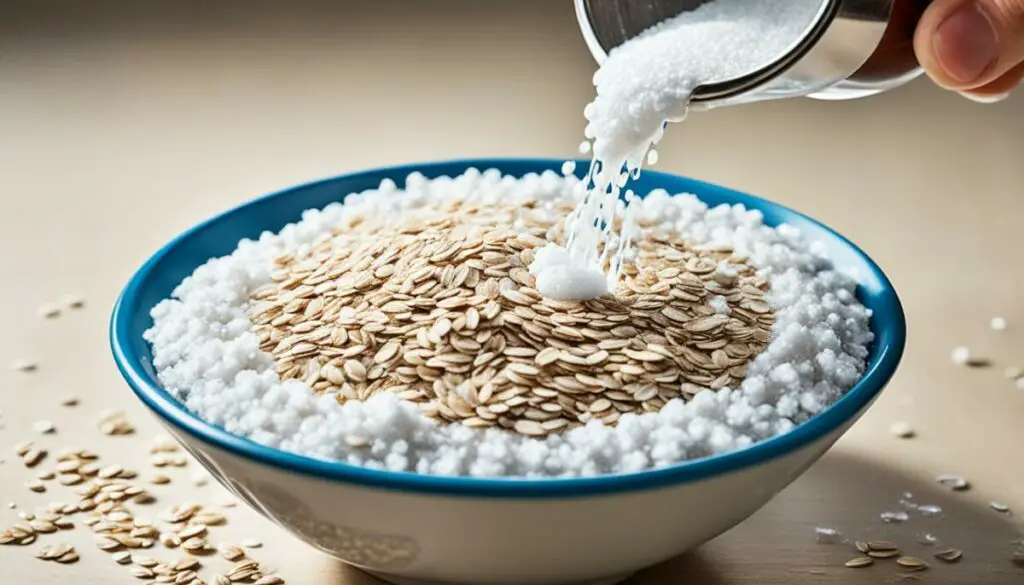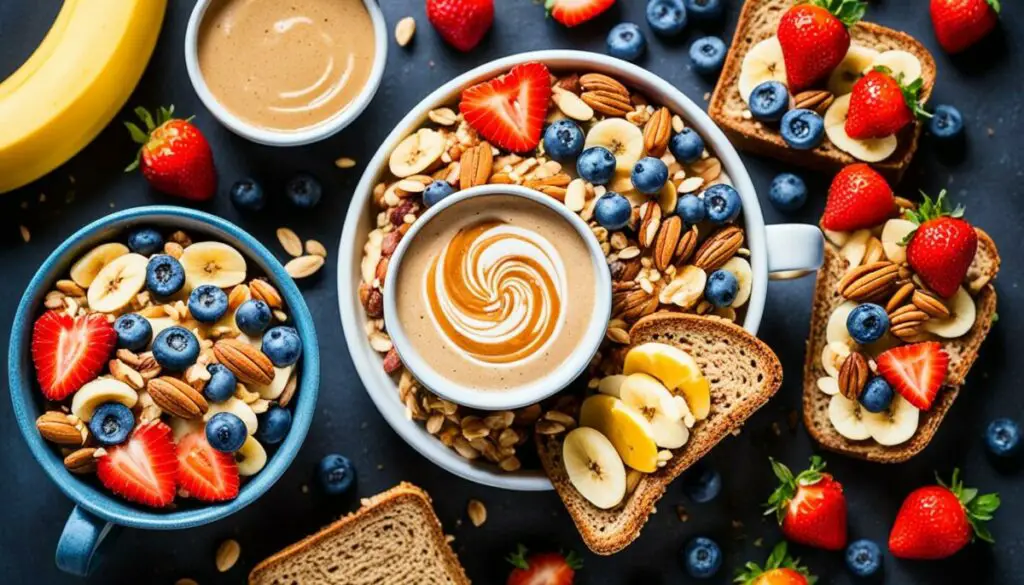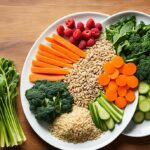Last Updated on 3 months by Francis
Are you wondering what foods you should avoid eating for breakfast? Making the right choices in the morning is crucial for starting your day on a healthy note. While it’s important to fuel your body with nutritious options, there are certain breakfast foods that you should steer clear of. Let’s explore what not to eat for breakfast and discover healthier alternatives!
Skipping breakfast or opting for unhealthy morning meal options can have negative effects on your energy levels and overall health. It’s essential to make wise choices to support your well-being. By avoiding these breakfast mistakes and opting for healthier options, you can set yourself up for a successful day.
Contents
Key Takeaways:
- Choosing the right breakfast foods is important for maintaining energy levels and overall health.
- Avoiding unhealthy breakfast choices is crucial to prevent negative effects on your well-being.
- Opting for nutritious alternatives can provide the necessary fuel for your body in the morning.
- Establishing a healthy breakfast routine can contribute to improved overall health and well-being.
- Prioritize protein, fiber, and whole foods in your morning meal for optimal health benefits.
Why is Breakfast Important?

Breakfast is often referred to as the most important meal of the day. Eating a nutritious meal in the morning provides your body with the fuel it needs to kickstart your metabolism, maintain stable blood sugar levels, and improve focus and concentration throughout the day. Skipping breakfast can lead to feelings of fatigue, decreased energy levels, and overeating later in the day.
| Benefits of Eating Breakfast | Effects of Skipping Breakfast |
|---|---|
|
|
Eating a balanced breakfast that includes protein, fiber, and whole grains sets the tone for healthy eating throughout the day. It provides the necessary nutrients to sustain energy levels and helps manage weight by reducing the chances of consuming excessive calories later on.
Additionally, studies have shown that breakfast consumption is associated with improved academic performance in children and adolescents.
“A healthy breakfast jumpstarts your day and keeps your body fueled for optimal performance. It’s like giving your car the right kind of fuel to ensure a smooth ride.”
Breakfast and Energy Levels
By replenishing glucose levels after an overnight fast, breakfast provides the necessary energy to kickstart your day. It fuels your body and brain, allowing you to perform daily activities with vitality and alertness. Incorporating protein-rich foods, such as eggs or yogurt, into your breakfast can provide sustained energy and prevent mid-morning energy crashes.
Breakfast and Weight Management
A balanced breakfast plays a crucial role in maintaining a healthy weight. It helps regulate appetite and prevents overeating later in the day. By providing essential nutrients, breakfast contributes to satiety, reducing the likelihood of snacking on unhealthy foods. Research has shown that individuals who regularly consume breakfast are more likely to maintain a healthy weight compared to those who skip this important meal.
Foods to Avoid for Breakfast

While it’s important to prioritize breakfast for a healthy start to your day, not all breakfast options are created equal. There are certain foods that you should avoid or limit in your morning meal to ensure optimal health and energy levels.
Sugary Cereals: Instead of reaching for cereals loaded with added sugars, opt for whole grain cereals that are lower in sugar content. Consider topping your cereal with fresh fruits for added flavor and nutrition.
Pastries: Pastries like croissants, muffins, and donuts may be tempting, but they are typically high in refined carbohydrates, unhealthy fats, and sugars. These can lead to energy crashes and weight gain. Choose whole grain toast or a homemade oatmeal instead.
Processed Meats: Breakfast meats like bacon, sausages, and ham are often high in sodium, unhealthy fats, and preservatives. Regular consumption of processed meats has been linked to an increased risk of heart disease. Opt for leaner protein options like turkey or chicken.
High-Fat Dishes: Greasy breakfast meals, such as fried eggs, buttery hash browns, and fatty bacon, can leave you feeling sluggish and contribute to weight gain. Instead, try egg whites with vegetables, sweet potato hash, or leaner protein sources like grilled chicken or tofu.
By avoiding these unhealthy breakfast options, you can start your day off on a healthier note. Opt for nutritious alternatives that provide essential nutrients and fuel your body for a productive day ahead.
Comparison of Unhealthy Breakfast Options vs. Healthier Alternatives
| Unhealthy Breakfast Options | Healthier Alternatives |
|---|---|
| Sugary Cereals | Whole Grain Cereals with Fresh Fruits |
| Pastries | Whole Grain Toast or Homemade Oatmeal |
| Processed Meats | Lean Protein Options like Turkey or Chicken |
| High-Fat Dishes | Egg Whites with Vegetables or Leaner Proteins |
Remember, the choices you make for breakfast can set the tone for your entire day. By opting for healthier alternatives, you’ll fuel your body with the nutrients it needs to thrive.
The Problem with Low-Fat Muffins and Scones

When it comes to breakfast, many people opt for low-fat muffins and scones, thinking they are making a healthier choice. However, these seemingly innocent morning treats can actually be loaded with unhealthy ingredients and have negative effects on your overall well-being.
Low-fat muffins and scones often contain high amounts of sugar and refined carbs. These ingredients can lead to blood sugar spikes, causing a rapid increase in glucose levels followed by a sharp drop. This rollercoaster effect can leave you feeling fatigued, hungry, and craving more unhealthy snacks throughout the day.
To illustrate the issue with low-fat muffins and scones, take a look at the following table:
| Product | Sugar Content | Refined Carbs |
|---|---|---|
| Low-Fat Blueberry Muffin | 25g | 32g |
| Reduced-Fat Lemon Scone | 18g | 27g |
As you can see, these breakfast items contain a significant amount of sugar and refined carbs, contributing to a host of health issues, including weight gain, increased risk of diabetes, and cardiovascular problems.
To make a healthier choice for breakfast, consider alternatives that are lower in sugar and contain more whole grains. Whole grain toast or oatmeal topped with all-fruit jam or fresh berries are great options that provide sustained energy and nourishment without the negative effects of refined carbs and excessive sugar.
By being mindful of the nutritional content of your morning meal, you can start your day off on the right foot and support your overall health and well-being.
Instant Oatmeal and Its Hidden Sodium

Instant oatmeal has long been a go-to breakfast choice for its convenience and comforting warmth. However, what many people are unaware of is the high sodium content often found in instant oatmeal brands. Excess sodium intake can pose numerous health risks, including the development of high blood pressure, increased risk of heart disease, and kidney problems.
Sodium is an essential mineral that helps to regulate the fluid balance in our bodies. However, consuming too much sodium, especially in processed foods like instant oatmeal, can lead to negative health effects. The American Heart Association recommends limiting sodium intake to 2,300 milligrams per day for adults, but some brands of instant oatmeal can contain up to 400 milligrams of sodium per serving.
To put it into perspective, a cup of instant oatmeal with added flavorings can contribute almost 20% of the recommended daily sodium intake. This significant sodium load can be problematic, especially for individuals who already have hypertension or are trying to manage their blood pressure levels.
So, what can you do to still enjoy the heartiness of oatmeal without compromising your sodium levels? An excellent alternative to instant oatmeal is to choose steel-cut or rolled oats, which have significantly less sodium and offer more nutritional benefits.
Why Choose Steel-Cut or Rolled Oats?
Steel-cut and rolled oats are minimally processed, preserving their natural nutritional value. These oats contain more fiber and protein compared to instant oats, making them a more filling and nourishing option. The cooking process for steel-cut or rolled oats takes a bit longer, but the time investment is well worth the health benefits.
Additionally, preparing steel-cut or rolled oats from scratch allows you to have more control over the sodium content. You can choose to cook them in plain water or unsweetened plant-based milk, eliminating the unnecessary sodium found in pre-packaged instant oatmeal.
Here is a comparison of the nutritional content of instant oatmeal versus steel-cut oats:
| Nutrient | Instant Oatmeal | Steel-Cut Oats |
|---|---|---|
| Calories | 150 | 140 |
| Protein (g) | 4 | 5 |
| Fiber (g) | 3 | 4 |
| Sodium (mg) | 150 | 0 |
| Sugar (g) | 12 | 0 |
As you can see, steel-cut oats offer more protein and fiber while containing zero sodium and added sugars. By making the switch to steel-cut or rolled oats, you can enjoy a heart-healthy breakfast that keeps you satisfied and energized throughout the morning.
To make your steel-cut or rolled oats even more delicious, consider adding fresh or frozen fruits, nuts, seeds, or a drizzle of natural sweeteners like honey or maple syrup. These nutrient-rich toppings will enhance the flavor and provide an extra boost of vitamins and minerals.
“When it comes to instant oatmeal, it’s important to read the nutrition labels carefully. The high sodium content can be unexpected and harmful to individuals watching their blood pressure. Making your own steel-cut or rolled oats allows you to take control of your sodium intake and enjoy a wholesome, heart-healthy breakfast.”
Remember, breakfast is an essential part of your day, and making nutritious choices in the morning sets the tone for your overall well-being. By opting for steel-cut or rolled oats, you can nourish your body without the health risks associated with excess sodium found in many instant oatmeal brands.
The Dangers of Sugary Breakfast Cereals

Many breakfast cereals marketed as healthy options are actually loaded with sugar. Consuming high-sugar breakfast cereals can have detrimental effects on your health. Excessive sugar consumption has been linked to an increased risk of chronic diseases, weight gain, and energy crashes throughout the day.
It’s important to be mindful of the sugar content in the cereals you choose for breakfast. Opting for cereals with low sugar content can help you maintain a healthier diet and reduce the negative effects of excessive sugar intake.
To make a more nutritious choice, consider homemade granola with whole grains, nuts, and seeds as a healthier alternative to sugary cereals. This allows you to control the amount of sugar and incorporate wholesome ingredients into your breakfast.
Effects of Excessive Sugar Consumption
Consuming excessive amounts of sugar, especially in the morning, can have a range of negative effects on your health:
- Weight gain: High-sugar cereals can contribute to weight gain and obesity due to their caloric content and potential to disrupt appetite regulation.
- Increased risk of chronic diseases: Excessive sugar consumption has been associated with a higher risk of chronic conditions such as type 2 diabetes, heart disease, and certain cancers.
- Energy crashes: Consuming high-sugar breakfast cereals can lead to a sharp rise in blood sugar levels followed by a rapid drop, resulting in feelings of fatigue and decreased energy levels throughout the day.
- Poor nutrient intake: Sugary cereals often lack essential nutrients, such as fiber, protein, and vitamins, which are important for overall health and wellbeing.
By choosing cereals with low sugar content or making your own healthier alternatives, you can avoid these negative effects and start your day on a more nutritious and energizing note.
| Cereal | Sugar Content per Serving |
|---|---|
| Brand A | 15g |
| Brand B | 20g |
| Brand C | 25g |
| Brand D | 30g |
As shown in the table above, there can be significant variations in sugar content among different cereal brands. By opting for cereals with lower sugar content, you can make a more informed choice and reduce your overall sugar consumption.
Remember, breakfast is an important meal and should provide you with the necessary nutrients to start your day right. By avoiding high-sugar breakfast cereals and choosing healthier alternatives, such as homemade granola or cereals with lower sugar content, you can fuel your body in a way that promotes overall health and wellbeing.
Processed Meats and Unhealthy Breakfast Sandwiches

When it comes to breakfast sandwiches, convenience is often prioritized over health. Many popular options on the market today contain processed meats such as bacon, sausage, and ham. While these sandwiches may be tasty and convenient, they come with a host of health risks.
Processed meats are a common ingredient in breakfast sandwiches, but they are not without their drawbacks. These meats are typically high in sodium, unhealthy fats, and preservatives. Consuming processed meats regularly has been linked to an increased risk of heart disease, certain types of cancer, and other health issues.
According to the American Heart Association, a diet high in processed meats can raise blood pressure and increase the risk of developing cardiovascular diseases. These meats are often made from low-quality cuts and can be loaded with additives and fillers. They may also contain nitrates and nitrites, which have been associated with an increased risk of cancer.
The Link Between Processed Meats and Health Risks
Research has shown that eating processed meats regularly can have a negative impact on your health. One study published in the journal Circulation found that consuming just one serving of processed meat per day was associated with a 42% higher risk of developing heart disease.
“Processed meats are often high in saturated fats and sodium, both of which can contribute to an unhealthy diet and increase the risk of chronic diseases,” says Dr. Sarah Johnson, a nutrition expert at the Mayo Clinic.
The combination of unhealthy fats and excess sodium in processed meats can lead to weight gain, high blood pressure, and inflammation in the body. These factors can contribute to the development of chronic diseases such as obesity, diabetes, and certain types of cancer.
Create a Healthier Breakfast Sandwich
To reduce your intake of processed meats in breakfast sandwiches, consider making your own at home. Opt for lean protein options like turkey or chicken breast, which are lower in sodium and unhealthy fats.
Here’s a simple recipe to get you started:
- Toast a whole grain English muffin.
- Cook a skinless, boneless turkey or chicken breast and slice it thinly.
- Add a slice of low-fat cheese and some fresh vegetables like lettuce, tomato, and avocado.
- Season with herbs and spices like black pepper and oregano.
- Enjoy your homemade, healthier breakfast sandwich!
By making your own breakfast sandwich, you have more control over the ingredients and can choose healthier options. This way, you can still enjoy a delicious and satisfying breakfast without compromising your health.
| Health Risks of Processed Meats | Healthier Breakfast Sandwich Options |
|---|---|
| High in sodium | Use low-sodium deli meat or opt for lean protein like turkey or chicken |
| Unhealthy fats | Choose low-fat cheese or skip it altogether |
| Preservatives and additives | Prepare fresh ingredients and avoid processed meats |
| Risk of heart disease | Include heart-healthy ingredients like avocado and whole grain bread |
By replacing processed meats with healthier alternatives, you can enjoy a breakfast sandwich that nourishes your body and supports your overall well-being.
Next, we’ll explore the importance of protein and fiber in breakfast and provide some delicious and nutritious alternatives to traditional breakfast sandwiches.
Importance of Protein and Fiber in Breakfast

Protein and fiber are two important nutrients that should be included in your breakfast. They provide numerous benefits and contribute to a balanced and nutritious start to your day.
Benefits of Protein in Breakfast
Protein plays a crucial role in keeping you full and satisfied, making it an essential component of a healthy breakfast. When you consume protein in the morning, it helps to regulate your appetite throughout the day, preventing excessive snacking and overeating.
Furthermore, protein contributes to the repair and maintenance of tissues in your body and supports the growth and development of muscles. Including protein-rich foods in your breakfast will not only keep you satiated but also aid in maintaining a healthy weight and promoting muscle strength.
Benefits of Fiber in Breakfast
Fiber is another essential nutrient that is beneficial to include in your breakfast. It aids in digestion and promotes a healthy gut. Consuming an adequate amount of fiber in the morning can help regulate bowel movements and prevent constipation.
In addition to its digestive benefits, fiber also contributes to heart health by reducing cholesterol levels and promoting a healthy cardiovascular system. Including fiber-rich foods in your breakfast can lower the risk of heart disease and improve overall heart health.
Protein and Fiber-Rich Breakfast Options
When it comes to incorporating protein and fiber into your breakfast, there are several delicious and nutritious options to choose from. Consider the following:
| Protein-Rich Foods | Fiber-Rich Foods |
|---|---|
| Eggs | Whole grain toast |
| Greek yogurt | Oatmeal |
| Protein smoothies | Fruits and vegetables |
| Nuts and seeds | Legumes |
By incorporating these protein and fiber-rich foods into your breakfast, you can enjoy a well-rounded meal that will provide you with sustained energy and numerous health benefits.
Healthy Breakfast Alternatives
When it comes to starting your day off right, choosing healthy breakfast options is key. Instead of reaching for unhealthy choices, there are plenty of nutritious alternatives that will fuel your body and set you up for success. Here are some balanced breakfast choices that are not only filling but also energizing:
- Smoothies with fruits and vegetables: Blend up a mix of your favorite fruits and leafy greens for a refreshing and nutrient-packed morning meal. You can also add a scoop of protein powder or a dollop of Greek yogurt for an extra boost.
- Whole grain toast with avocado or nut butter: Opt for whole grain bread, which is higher in fiber and nutrients compared to refined options. Top it with sliced avocado or a spread of nut butter for a satisfying combination of healthy fats and protein.
- Omelets loaded with veggies: Whip up a delicious omelet using eggs or egg whites and fill it with an array of colorful vegetables like bell peppers, spinach, mushrooms, and onions. This protein-packed breakfast will keep you full throughout the morning.
- Overnight oats with nuts and seeds: Prepare a batch of overnight oats the night before by combining rolled oats with your choice of milk, nuts, seeds, and a touch of honey or maple syrup. In the morning, grab and go! This fiber-rich breakfast provides long-lasting energy.
These nutritious morning meals are easy to prepare and offer a mix of protein, fiber, and healthy fats to keep you satisfied and energized. Incorporating these balanced breakfast choices into your routine will set the stage for a productive day ahead. Give them a try and experience the difference they make in your overall well-being.
The Importance of Establishing a Healthy Breakfast Routine
Consistency is key when it comes to breakfast. By establishing a regular breakfast routine, you can enjoy a myriad of benefits that contribute to your overall health and well-being. Here are some of the advantages of maintaining consistent breakfast habits:
- Regulated Metabolism: Starting your day with a nutritious breakfast kickstarts your metabolism, aiding in weight management and energy regulation throughout the day.
- Improved Nutrient Absorption: Consuming a balanced breakfast enables your body to better absorb essential nutrients from the foods you eat, maximizing their benefits.
- Enhanced Cognitive Function: A healthy morning meal provides the necessary fuel for increased focus, concentration, and cognitive performance, setting you up for productivity.
- Sustained Energy Levels: A well-rounded breakfast consisting of proteins, whole grains, and fruits provides a sustained release of energy, preventing mid-morning energy crashes.
- Elevated Mood: Starting your day with a nourishing meal can positively impact your mood and overall outlook, promoting a positive mindset.
To establish a healthy breakfast routine, keep these tips in mind:
- Plan Ahead: Preparing a weekly meal plan and buying groceries in advance ensures that you have all the necessary ingredients for a balanced breakfast at hand.
- Make Time: Allow yourself enough time in the morning to prepare and enjoy your breakfast mindfully, making it a peaceful and enjoyable part of your day.
- Choose Nutritious Ingredients: Opt for whole foods such as lean proteins, whole grains, fruits, and vegetables to provide your body with the essential nutrients it needs.
- Vary Your Options: Explore different recipes and breakfast ideas to keep your routine interesting and prevent monotony.
- Listen to Your Body: Pay attention to how different foods make you feel and adjust your breakfast choices accordingly to meet your individual needs.
By establishing a healthy breakfast routine, you can set yourself up for a successful day filled with energy, focus, and well-being.
| Benefits of a Healthy Breakfast Routine |
|---|
| Regulated Metabolism |
| Improved Nutrient Absorption |
| Enhanced Cognitive Function |
| Sustained Energy Levels |
| Elevated Mood |
Conclusion
In conclusion, choosing a healthy breakfast is essential for your overall health and well-being. By avoiding unhealthy breakfast choices and opting for nutritious alternatives, you can set yourself up for a successful day.
Throughout this article, we have highlighted the importance of breakfast as the most important meal of the day. Eating a nutritious breakfast provides your body with the fuel it needs to kickstart your metabolism, maintain stable blood sugar levels, and improve focus and concentration.
To ensure a healthy breakfast, it is important to prioritize protein, fiber, and whole foods in your morning meal. Incorporating foods such as eggs, Greek yogurt, whole grains, fruits, and vegetables can help you feel full and satisfied, promote digestion, and provide essential nutrients to support your overall health.
Additionally, establishing a regular breakfast routine is key. By setting aside time in the morning to prepare and enjoy a balanced breakfast, you can establish healthy habits, regulate your metabolism, and support nutrient absorption.
FAQ
What foods should I avoid eating for breakfast?
It’s best to avoid or limit foods such as sugary cereals, pastries, processed meats, and high-fat dishes for a healthier breakfast.
Why is breakfast important?
Eating a nutritious breakfast provides the fuel your body needs to kickstart your metabolism, maintain stable blood sugar levels, and improve focus and concentration throughout the day.
What are some unhealthy breakfast options to avoid?
Unhealthy breakfast choices include low-fat muffins and scones, instant oatmeal high in sodium, sugary breakfast cereals, and breakfast sandwiches with processed meats.
What’s wrong with low-fat muffins and scones?
While they may seem like a healthier option, low-fat muffins and scones are often high in sugar and refined carbs, leading to energy crashes and increased hunger.
Why is instant oatmeal a problem?
Instant oatmeal frequently contains high levels of sodium, which can contribute to health problems like high blood pressure. It’s better to choose steel-cut or rolled oats with healthier toppings.
What’s the issue with sugary breakfast cereals?
Many breakfast cereals marketed as healthy options are loaded with sugar, which can lead to weight gain, increased risk of chronic diseases, and energy crashes. Look for low-sugar alternatives or make homemade granola.
What’s wrong with processed meats in breakfast sandwiches?
Processed meats like bacon, sausage, and ham are high in sodium, unhealthy fats, and preservatives. Regular consumption of processed meats has been linked to an increased risk of heart disease and other health issues.
Why are protein and fiber important for breakfast?
Protein helps keep you full and satisfied, while fiber aids in digestion and promotes a healthy gut. Incorporate foods like eggs, Greek yogurt, whole grains, fruits, and vegetables into your morning meal for a balanced and nutritious start to your day.
What are some healthy breakfast alternatives?
Healthy breakfast options include smoothies with fruits and vegetables, whole grain toast with avocado or nut butter, omelets loaded with veggies, and overnight oats with nuts and seeds. These meals provide a mix of protein, fiber, and healthy fats for satisfaction and energy.
Why is establishing a healthy breakfast routine important?
Establishing a regular breakfast routine can help regulate your metabolism, improve nutrient absorption, and support overall health. Plan ahead, choose nutritious ingredients, and make breakfast a priority for a successful day.
What’s the conclusion on choosing a healthy breakfast?
Choosing a healthy breakfast is crucial for your overall health and well-being. Avoiding unhealthy breakfast choices and opting for nutritious alternatives can set you up for a productive and energized day.








